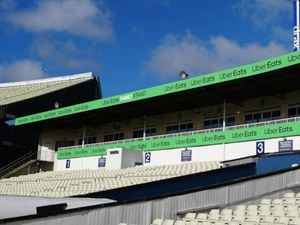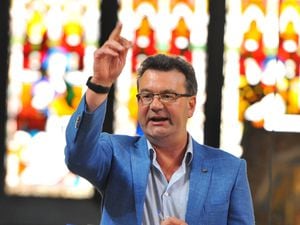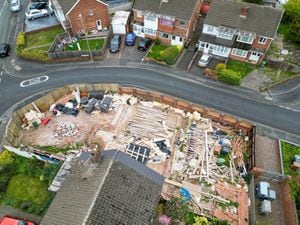Day Malcolm X came to town
The American man's words were blunt, their message foreboding.
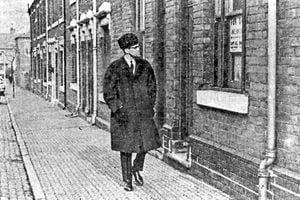
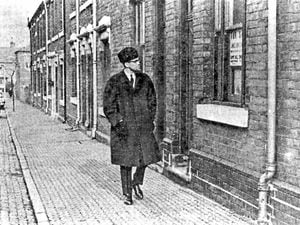
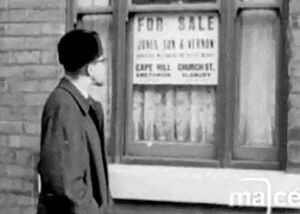
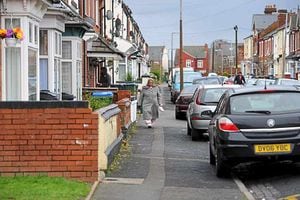
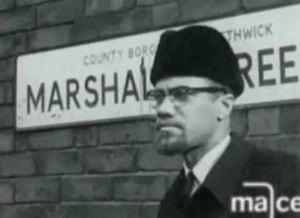
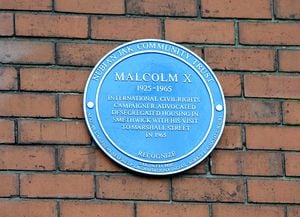
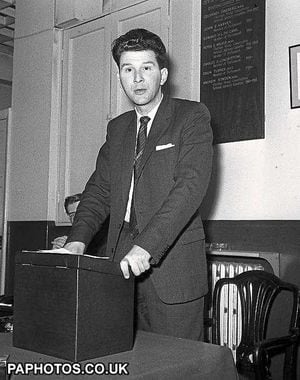

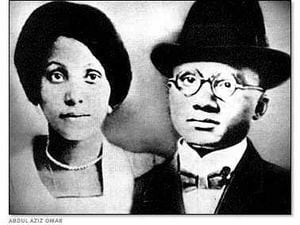
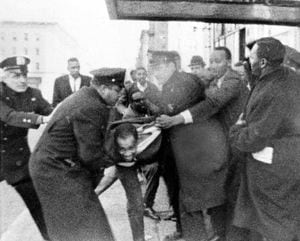
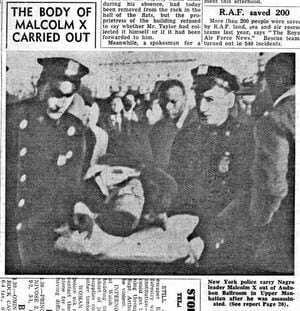
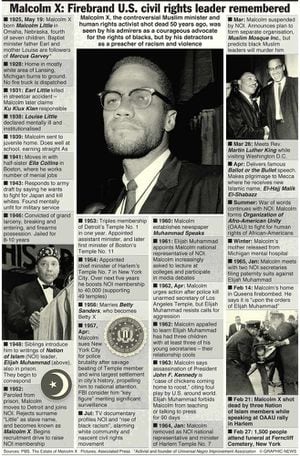
"I have come," he said, "because I am disturbed by reports that coloured people in Smethwick are being treated badly. I have heard that they are being treated as the Jews were under Hitler."
Today, 50 years on from that brief speech, a blue plaque is mounted on the side of a house in Marshall Street, Smethwick.
He was born Malcolm Little in May 1925 in Omaha, Nebraska, the fourth of eight children.
His father, Earl, was a preacher who also worked with an association that sought to improve the lives of black people.

Because of this, the family was regularly harassed by white supremacists including the Ku Klux Klan.
When Malcolm was four, the family home's windows were smashed. So Earl moved them from Omaha to East Lansing in Michigan.
The racism there was even worse. A mob set their house on fire and the emergency services refused to do a thing.
Malcolm X would recall how white police and firefighters stood and watched their home burn.
In 1931 Earl was found dead on tram tracks. It was ruled as a suicide, meaning the life insurance policy he had been paying for refused to cover the family. Malcolm's mother Louise never recovered from her shock and six years later had to live in an institution.
Malcolm, not even a teenager by this point, went to live with friends of the family. His schooling did little to help him overcome the prejudices the family had suffered.
Even though Malcolm was bright and was elected class president – an impressive result given that he was the only black student – he believed he was treated more as a pet than an equal.
In 1939 his teacher asked what he wanted to be. Malcolm said a lawyer. He was told to be 'realistic' and consider a career in carpentry. A year later he dropped out of school aged 15 and moved to Boston to be with his half sister, Ella.
There he got a job shining shoes at the Roseland Ballroom. But he also fell in with criminal gangs and began selling drugs.
After a lavish lifestyle in night clubs, dealing to make money, he was arrested and given 10 years in prison. He read books and, encouraged by others, converted to Islam.
When he was released in 1952 he joined a sect of black Muslims who believed that black Americans should have their own state, separate from whites. This was the Nation of Islam. Malcolm abandoned his real surname and adopted X in tribute to the unknown names of his African ancestors.
He went to Detroit, Michigan, where he worked with Nation of Islam's leader Elijah Muhammad to boost membership and became a minister in Harlem and Boston. In 1960 he also set up a newspaper, Muhammad Speaks, to spread the group's message.
In a famous 'message to the grass roots' speech in 1963 he told black people to cast off the shackles of racism 'by any means necessary'.
"You don't have a peaceful revolution," he said. "You don't have a turn-the-other-cheek revolution. There's no such thing as a non-violent revolution ... Revolution is bloody, revolution is hostile, revolution knows no compromise, revolution overturns and destroys everything that gets in its way."
It was in stark contrast to Martin Luther King Junior's 'I have a dream' speech, delivered at the March on Washington earlier the same year and promoting a message of peace, equality and harmony.
left Nation of Islam and journeyed through North Africa and the Middle East. During a pilgrimage to Mecca he converted to traditional Islam.
It commemorates the visit of the civil rights activist Malcolm X.
Nine days later, back in the US, he was shot dead.
History records the spokesman for Black Power as a courageous man who sought equality for black people. At the time, his detractors saw him as a preacher of racism and violence.
What was the influential figure doing in Smethwick in the first place?
He had journeyed up from London following an address to the Council of African Organisations. He had already been refused entry to France.
Smethwick at that time was a byword for racism. The year before, a Conservative had won the election to be its MP on the back of what must have been the most appallingly racist slogan ever used in Britain in the latter half of the 20th century.
Peter Griffiths' supporters went around saying 'if you want a n***** for a neighbour, vote Labour'.
Marshall Street epitomised what risked becoming a battleground between the indigenous population and new arrivals from the West Indies, India and Pakistan.
Faced with mounting tension over immigration, the town's council was lobbied by local residents to buy up any properties that came onto the market and let them only to white families.
The group of residents, led by Alice Groves, got their way. But the plan was eventually vetoed by the Ministry of Housing.
Even in the 1960s, the policy for Marshall Street appalled people. Malcolm X believed it was only the beginning of something else that, left unchecked, would see Britain start to repeat the horrors that befell Jews in the Holocaust.
"I would not wait for the fascist element in Smethwick to erect gas ovens," he said.
Malcolm X was accompanied by a BBC camera crew. He posed by a For Sale sign on one of the houses.
The Express & Star reported the issue that very day with a photograph on the front page.
The front page piece said: "On Tuesday this bespectacled, bearded, quietly spoken man was not allowed to enter France, because it was felt that his presence there would disturb public order.
"For most of the morning Mr X sat in a car belonging to the BBC and tended to be evasive over questions fired at him through a car window."
The E&S revealed one of his replies was about why he had come to Smethwick: "I was in Birmingham, Alabama, the other day. This will give me a chance to see if Birmingham, England, is any different."
Asked if he would be staying long, he reportedly 'shrugged his shoulders, smiled and said: "I shall probably be back in New York tomorrow."
A Conservative councillor at the time, Don Finney, said he had refused to take part in a TV discussion with Malcolm X because he felt that any foreigner coming into Smethwick could not weigh up the situation in half an hour.
"Any argument of this kind by someone coming in from outside for a few hours would be purely hearsay and miles away from the truth," Mr Finney said.
"I am absolutely disgusted at the BBC for inviting this man to appear in a programme about Smethwick."
He compared it to the equivalent of asking Colin Jordan, the British post-war Nazi, to do the same.
Malcolm X then went to one of the pubs in Smethwick that did not operate a 'colour bar'.
At the time it was still allowed for pubs to ban black or Asian people from entering.
The pub he went to was said to have been full of Indians, all of whom wanted to shake his hand and who were happy he was there.
He had told the media in Marshall Street that he would be returning to the USA after he had denounced the policy of the council buying up homes in the road for white families.
Throughout the previous year, as the civil rights activist had been travelling the world, he had been repeatedly threatened by Nation of Islam – the controversial group that advocated separate states for black and white Americans.
Indeed, in the week leading up to his death, Malcolm X and his family survived a firebomb at their home in New York's Queen's district.
On the evening of February 21 1965, Malcolm X was preparing to deliver a speech at the Audubon Ballroom in Manhattan. In front of an audience of 400 people just outside the Harlem district, three men rushed at the stage and shot him 15 times at point blank range.

The 39-year-old was pronounced dead at Columbia Presbyterian Hospital. Malcolm X's lawyer, Percy Sutton, said the campaigner knew his life was in danger. "Malcolm knew he would be killed," Mr Sutton said.
Three men – Thomas Hagan, Muhammad Abdul Aziz and Kahlil Islam – were convicted of the murder.
They were members of Nation of Islam, with whom Malcolm X had severed relations having previously served as its main spokesman. Hagan was also known as Talmadge X Hayer. The three were given prison sentences in 1966. Hagan, who was 22 at the time of the killing, confessed but maintained the other two were not involved.
Aziz and Islam were released in the 1980s.
Hagan spent 45 years in prison but from 1988 he was only serving two days a week in a minimum security prison.
The rest of the time he was on a work-release programme and was allowed to live with his wife and children.
In 2008 he told a court he had been a young man who 'acted out of rage on impulse and loyalty' to religious leaders.
Five years ago, as he prepared to be released altogether, he expressed regret for shooting Malcolm X. "I've had a lot of time, a heck of a lot of time to think about it," Hagan said.
"Being more educated in terms of social events and so forth, I understand a lot better the dynamics of movements and what can happen inside movements and conflicts that can come up, but I have deep regrets about my participation in that."
It was the 17th time that he had appealed for release before the parole board agreed.
While he was on his work-release programme, Hagan had spent five days a week working in places such as a homeless shelter. He told parole officers that he wanted to become a substance abuse counsellor. The release was criticised at the time by the Malcolm X Commemoration Committee, who said the crime was too serious to allow for Hagan to be set free.
"Malcolm X was and still is an enormous international figure and revolutionary hero," said spokesman Zayid Muhammad.
Although Malcolm X had renounced his belief in racial separatism, the media was not forgiving.
After his death, a New York Times editorial called him a 'twisted man'.
Time magazine described him as a demagogue whose 'gospel was hatred'.
In Smethwick, the practice of colour bars was so widespread even the Labour Club had one.
Bob Badham was 18 years old at the time and working as a laboratory technician at Birmingham University.
His family lived in Montague Road, Smethwick and he saw first-hand the tensions that were rising around immigration.
Mr Badham would go on to be one of the leading cabinet councillors in Sandwell. He retired last year.
But he also spent 25 years as chairman of the Community of Asians Council.
The role was not one that earned him many plaudits.
Indeed he recalls how he would return home from meetings to find the police waiting for him to warn him a threat had been made.
"I used to have to use a letter opener because I would get items through the post with razor blades in," he said. "I would get threats from people claiming to be from the National Front or the Ku Klux Klan."
Mr Badham believed he was just being a good neighbour. I remember one night there was a Sikh family down the road from us and their power went off.
"My dad went round and mended a fuse for them. That's what neighbours do. He didn't think anything of it.
"The Sikh family were delighted. They came around and knocked the door and gave us a home made egg custard as a thank you. But other people didn't like it."
Mr Badham believes the problems in the community stemmed from people being left to just react to new arrivals themselves. "The government did not put extra help in to areas where people were coming to live and there were large influxes," he said.
"There was work for these people to do.
"There were jobs the indigenous population at the time did not seem to want, such as driving buses. But many people had never seen a black or Asian person before.
"The new arrivals were also given no help so they looked to each other for support. It made integration very difficult.
"Eventually, to their credit, the communities did this themselves and things are much better now. But it didn't have to be like this."
The Malcolm X visit has become the stuff of legend and has been revisited in documentaries and academic work.
Stephen Page, from Darlaston, made a film about the visit. It featured interviews with politicians, young people and members of the community, discussing why Malcolm X came to Smethwick and how his influence is still evident in the town.
Mr Page, aged 48 and originally of Slater Street, has spent years working in Hollywood, acting in TV series including the hit Lost.
Of his Malcolm X documentary he said: "I remembered reading about it in the 1980s and realised a lot of people never knew Malcolm X had been to Smethwick. I thought that was odd.
"I won a commission to make the film, A Day In Smethwick."
In 2012 a blue plaque was put on the side of a house in Marshall Street.
"It was first suggested by the Nubian Jak Community Trust, which organises Britain's only black and minority ethnic national plaque scheme.
Spokesman Jak Beula said: "Malcolm X's visit brought the spotlight to Smethwick. It's very sad he did not live to see the benefit of his visit.
"Today there are people born in Smethwick to parents and grandparents who were born elsewhere.
"People are people. They should not be judged by their race or culture. It was something that needed to be said at the time." Mr Badham said: "At the time it was several days before many people would have found out. It's not like today with news travelling instantly.
"I lived a couple of miles away and knew nothing about it."
Malcolm X was killed nine days later, as he was starting a speech in the Audubon Ballroom in Harlem.
The only man to have admitted his part in the killing, Thomas Hagan, was released in April 2010.
Two other men he claimed were not involved were released on parole in the 1980s.
Hagan said the assassination was planned because Malcolm X had been criticial of Elijah Muhammad, the leader of the Nation of Islam and a former mentor.

As for the then Tory MP Mr Griffiths, he maintained the slogan used by some of his supporters was nothing to do with him.
But the then Labour Prime Minister Harold Wilson proclaimed that Mr Griffiths should serve his time in the Commons as a 'Parliamentary leper'.

He was defeated in the 1966 election by Labour's Andrew Faulds and went back to working in education, returning to the Commons in 1979 as MP for Portsmouth North. He held the seat until 1997 and died in 2013.
Express & Star historian Carl Chinn said the past 50 years had resulted in a far more harmonious community.
"Thankfully we've moved on," Professor Chinn said. "There's a massive difference between the West Midlands today and then in the way we all work together and respect each other. We know we all belong to the West Midlands."

